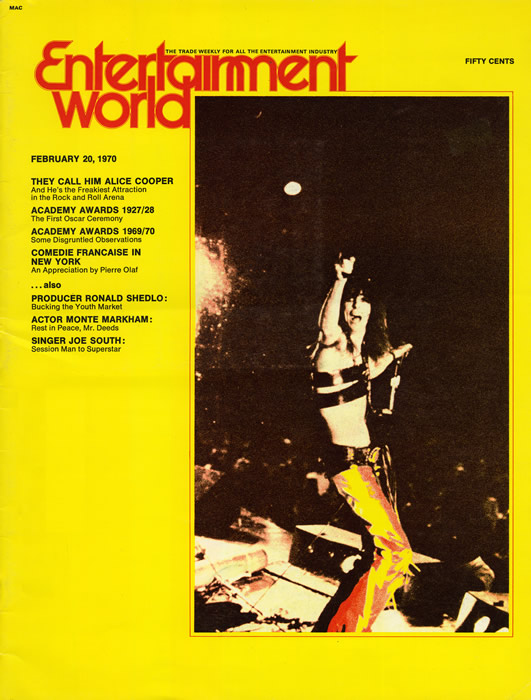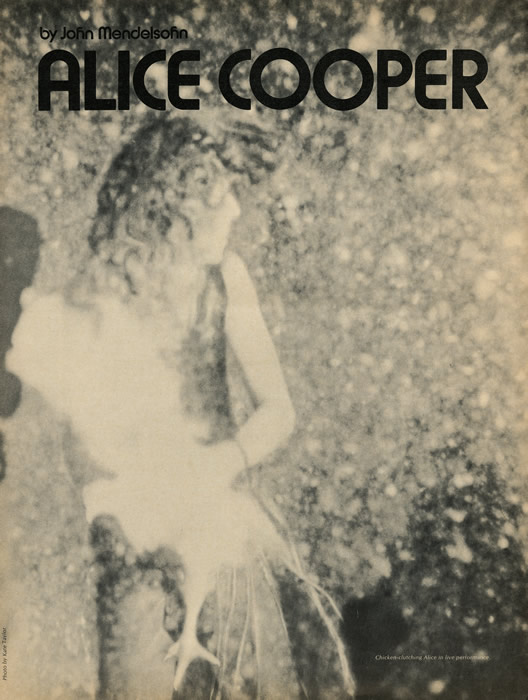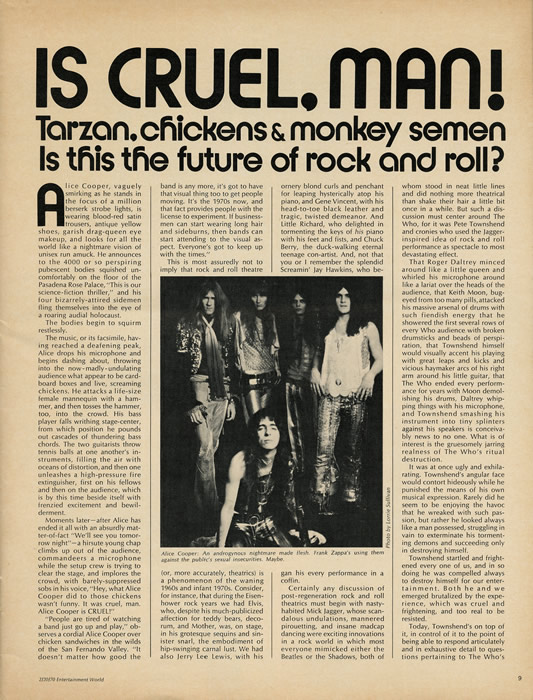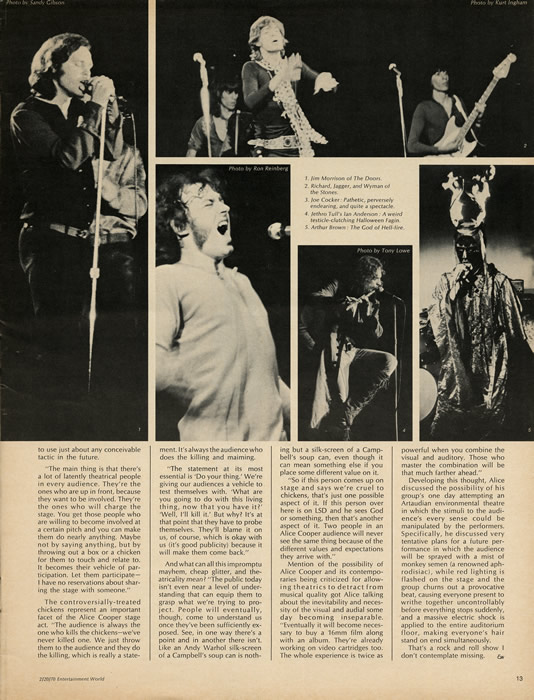Article Database
Alice Cooper Is Cruel, Man!
Tarzan, chickens & monkey semen. Is this the future of rock and roll?
Alice Cooper, vaguely smirking as he stands in the focus of a million berserk strobe lights, is wearing blood-red satin trousers, antique yellow shoes, garish drag-queen eye makeup, and looks for all the world like a nightmare vision of unisex run amuck. He announces to the 4000 or so perspiring pubescent bodies squished uncomfortably on the floor of the Pasadena Rose Palace, "This is our science-fiction thriller," and his four bizarrely-attired sidemen fling themselves into the eye of a roaring audial holocaust.
The bodies begin to squirm restlessly.
The music, or its facsimile, having reached a deafening peak, Alice drops his microphone and begins dashing about, throwing into the now-madly-undulating audience what appear to be cardboard boxes and live, screaming chickens. He attacks a life-size female mannequin with a hammer, and then tosses the hammer, too, into the crowd. His bass player falls writhing stage-center, from which position he pounds out cascades of thundering bass chords. The two guitarists throw tennis balls at one another's instruments, filling the air with oceans of distortion, and then one unleashes a high-pressure fire extinguisher, first on his fellows and then on the audience, which is by this time beside itself with frenzied excitement and bewilderment.
Moments later - after Alice has ended it all with an absurdly matter-of-fact "We'll see you tomorrow night" - a hirsute young chap climbs up out of the audience, commandeers a microphone while the setup crew is trying to clear the stage, and implores the crowd, with barely-suppressed sobs in his voice, "Hey, what Alice Cooper did to those chickens wasn't funny. It was cruel, man. Alice Cooper is CRUEL!"
"People are tired of watching a band just go up and play," observes a cordial Alice Cooper over chicken sandwiches in the wilds of the San Fernando Valley. "It doesn't matter how good the band is any more, it's got to have that visual thing too to get people moving. It's the 1970s now, and that fact provides people with the license to experiment. If businessmen can start wearing long hair and sideburns, then bands can start attending to the visual aspect. Everyone's got to keep up with the times."
This is most assuredly not to imply that rock and roll theatre (or, more accurately, theatrics) is a phenomenon of the waning 1960s and infant 1970s. Consider, for instance, that during the Eisenhower rock years we had Elvis, who, despite his much-publicized affection for teddy bears, decorum, and Mother, was, on stage, in his grotesque sequins and sinister snarl, the embodiment of hip-swinging carnal lust. We had also Jerry Lee Lewis, with his ornery blond curls and penchant for leaping hysterically atop his piano, and Gene Vincent, with his head-to-toe black leather and tragic, twisted demeanor. And Little Richard, who delighted in tormenting the keys of his piano with his feet and fists, and Chuck Berry, the duck-walking eternal teenage con-artist. And, not that you or I remember the splendid Screamin' Jay Hawkins, who began his every performance in a coffin.
Certainly any discussion of post-regeneration rock and roll theatrics must begin with nasty-habited Mick Jagger, whose scandalous undulations, mannered pirouetting, and insane madcap dancing were exciting innovations in a rock world in which most everyone mimicked either the Beatles or the Shadows, both of whom stood in neat little lines and did nothing more theatrical than shake their hair a little bit once in a while. But such a discussion must center around The Who, for it was Pete Townshend and cronies who used the Jagger-inspired idea of rock and roll performance as spectacle to most devastating effect.
That Roger Daltrey minced around like a little queen and whirled his microphone around like a lariat over the heads of the audience, that Keith Moon, bug-eyed from too many pills, attacked his massive arsenal of drums with such fiendish energy that he showered the first several rows of every Who audience with broken drumsticks and beads of perspiration, that Townshend himself would visually accent his playing with great leaps and kicks and vicious haymaker arcs of his right arm around his little guitar, that The Who ended every performance for years with Moon demolishing his drums, Daltrey whipping things with his microphone, and Townshend smashing his instrument into tiny splinters against his speakers is conceivably news to no one. What is of interest is the gruesomely jarring realness of The Who's ritual destruction.
It was at once ugly and exhilarating. Townshend's angular face would contort hideously while he punished the means of his own musical expression. Rarely did he seem to be enjoying the havoc that he wreaked with such passion, but rather he looked always like a man possessed, struggling in vain to exterminate his tormenting demons and succeeding only in destroying himself. Townshend startled and frightened every one of us, and in so doing he was compelled always to destroy himself for our entertainment. Both he and we emerged brutalized by the experience, which was cruel and frightening, and too real to be resisted.
Today, Townshend's on top of it, in control of it to the point of being able to respond articulately and in exhaustive detail to questions pertaining to The Who's theatricality and residual violence. Asked during The Who's last American tour why they still came on hostile, violent, and endlessly volatile on stage, Town-shend responded:
"It's like you might see a small group of 10 kids on the beach, right? Some of them have got big muscles and some of them have beautiful hair; some of them have nice white teeth, and some of them are ugly — there's just a whole variety of values in there. All of a sudden Tarzan walks onto the beach, and his cock's 12 inches long and he's got huge biceps and he's just all good vibes. He just comes over and sits down in the midst of these 10 kids. Instantly his presence makes them all far more aware of their basic equality.
"Incredible! I mean we represent Tarzan! I can tell you quite frankly that I'm nowhere near 12 inches long, but at the same time this is how in rock you feel you've got to come across. You've got to come across so vulgar, so heavy, so glamorous, so flippant, and so arrogant that your very presence creates equality among the audience. That's what rock has always been about and always will be about — creating in people a feeling of being together.
"It's necessary for us to be violent — it's our way of making up for the fact that we're not Tarzan and we're not 12 inches long."
The early Who have their current counterparts, perhaps the most popular of whom are Jethro Tull and Joe Cocker, both of whom betray the early Who's willingness to get made for us without seeking to control or specify our reactions. Tull center-attraction Ian Anderson, a strange, bearded creature, stands on one leg while he's playing and points delicate little toe kicks at the audience with the other, this while his group is cooking like the godsons of Cream or somebody. When he's not playing he dashes about making scary faces like some overgrown Halloween Fagin and clutching his testicles. Not really pathetic at all, merely a trifle laughable, he relaxes us and sets us up for the Tull's many musical knockout punches. Look at the funny, hairy fellow carrying on, dear.
Cocker, quite simply, represents the ultimate musical spastic. While he sings (in an immensely powerful and controlled middle-aged black man's voice that seems incapable of coming out of such an awkward young Briton), his limbs jerk around seemingly independent of one another and his madly twitching fingers claw the air desperately. It's real — he does it in the recording studio when no one's watching; it's also terrifically pathetic — a little endearing in a perverse sort of way — and the making of quite a spectacle. Look at that soulful spastic going into contortions, dear.
In contrast to the Cocker spectacle, the Doors have always been a group whose prohibitive unrealness makes them not at all frightening, but a little laughable. Jim Morrison's second-hand Jagger-isms, vinyl trousers and sexual craving for his mother always stopped a bit short, with a result that the Lizard King never seemed more than a pretentious ex-college kid trying hard to be ominous and succeeding only vaguely. The first time you saw him may have been impressive but how shocking was all that second-hand Oedipal nonsense on second hearing? And, if Morrison were really in that much agony, why did the other Doors always look as if they were on the verge of collapsing from boredom? Think about it: didn't Krieger and Manzarek always look just a bit embarrassed by it all?
Arthur Brown, on the other hand, picked up where Morrison left off and went, with considerable enthusiasm, to the necessary extremes. He'd let his band set the stage without him, wearing grotesque black-lite masks and bobbing and twitching around like mad. Then Arthur would be led on in a huge fiery helmet and he'd shriek himself blue in the face, except you didn't see his face until he peeled off about a dozen layers of masks and changed costumes after every song. When he got down to his bare flesh he'd maybe slice off little chunks of his cheek to liven things up a bit, an exhibition of self-mutilation which couldn't really be responded to with anything but genuine horror.
He went to lengths that Morrison never even approached, was quite credibly mad and subsequently quite terrifying. Morrison, somewhere light-years behind with his crumby vinyl pants and bored band, was always just sort of vaguely unsettling. Attacking from almost the identical direction, what made the Crazy World of Arthur Brown so infinitely more exciting a rock-and-roll theatre experience was its willingness to go all the way.
Among the theatrical rock groups whose forte was satire, there have been two tragic dissolutions in the past six months. The most recent was that of England's magnificent but little-noticed Bonzo Dog (Doo Dah) Band, who reportedly buckled under the weight of at least two of its six members' increased productivity, rolled over and played dead.
Utilizing a dazzling variety of elaborate props and costumes, the Bonzos on stage were a whirlwind succession of hysterically funny parodies, here of the gold-sequined 1950s rock-and-roll idols, there of the nauseatingly fake-modest, pop-shlock crooner, there of tap dancers or strippers. One evening with the Bonzos and you couldn't see another group for a week without giggling insanely at the attitudes and demeanor the Bonzos had made to look so infinitely foolish. And there was nothing they didn't have a little chuckle at. I adored them.
The Mothers, on the other hand, who were disbanded by the lovely Frank Zappa late last summer, were sometimes as funny but never as irresistible. Delighting in doing vile things to each other and whatever props were handy, they cultivated more revulsion than amusement, and were as often as not even boring (in deference to Mr. Zappa's genius, we can only assume that on such occasions they were trying to be). Although to the unsuspecting they might have appeared confused and a little anarchistic, they were at every moment subject to the whim of Mr. Zappa, under whose ingenious on-stage direction, they put on the most intricately-co-ordinated performances in the history of rock and roll.
Alice Cooper is, in fact, a protege of Zappa's. Well, even more than a protege, for, as Alice himself observes, "Sometimes I think Frank is using us as a political pawn. He attacks the public in different ways: He uses the GTOs or somebody against one segment of the public, Alice Cooper against another. He's using us against the public's sexual insecurities. I think he uses everybody he signs in some way."
"What we're trying to do is get at feelings that people can experience but not even express. We don't necessarily know how to express them ourselves, in fact. What we're trying to do is make people react in novel ways all the time, to feel new things as a result of being exposed to our particular light, movement, and sound combination. We provide a vehicle for experiencing new feelings, using the excuse that we're a rock and roll band when really we're just five people expressing ourselves in that way because it's the most convenient outlet at the moment."
Alice is intrigued with the possibility of the performer gaining such complete control of his audiences' reactions that he may manipulate it through mass hypnotism (at once an exciting and somewhat frightening prospect). "If you can control a whole audience," he explains, "you're doing a really new type of thing to it. The ultimate extent of that idea would be mass-hypnotizing the audience for some positive purpose. An audience might be willing to follow some basic suggestions, like to stand up, but you can't control their mental response to the suggestion without controlling the input into each of their senses, which is something that will come later. What we're doing now is the basic conditioning in preparation for that. What we're doing now will give us the license to use just about any conceivable tactic in the future.
"The main thing is that there's a lot of latently theatrical people in every audience. They're the ones who are up in front, because they want to be involved. They're the ones who will charge the stage. You get those people who are willing to become involved at a certain pitch and you can make them do nearly anything. Maybe not by saying anything, but by throwing out a box or a chicken for them to touch and relate to. It becomes their vehicle of participation. Let them participate — I have no reservations about sharing the stage with someone."
The controversially-treated chickens represent an important facet of the Alice Cooper stage act. "The audience is always the one who kills the chickens — we've never killed one. We just throw them to the audience and they do the killing, which is really a statement. It's always the audience who does the killing and maiming.
"The statement at its most essential is 'Do your thing.' We're giving our audiences a vehicle to test themselves with. 'What are you going to do with this living thing, now that you have it?' 'Well, I'll kill it.' But why? It's at that point that they have to probe themselves. They'll blame it on us, of course, which is okay with us (it's good publicity) because it will make them come back."
And what can all this impromptu mayhem, cheap glitter, and theatricality mean? "The public today isn't even near a level of understanding that can equip them to grasp what we're trying to project. People will eventually, though, come to understand us once they've been sufficiently exposed. See, in one way there's a point and in another there isn't. Like an Andy Warhol silk-screen of a Campbell's soup can is nothing but a silk-screen of a Campbell's soup can, even though it can mean something else if you place some different value on it.
"So if this person comes up on stage and says we're cruel to chickens, that's just one possible aspect of it. If this person over here is on LSD and he sees God or something, then that's another aspect of it. Two people in an Alice Cooper audience will never see the same thing because of the different values and expectations they arrive with."
Mention of the possibility of Alice Cooper and its contemporaries being criticized for allowing theatrics to detract from musical quality got Alice talking about the inevitability and necessity of the visual and audial some day becoming inseparable. "Eventually it will become necessary to buy a 16mm film along with an album. They're already working on video cartridges too. The whole experience is twice as powerful when you combine the visual and auditory. Those who master the combination will be that much farther ahead."
Developing this thought, Alice discussed the possibility of his group's one day attempting an Artaudian environmental theatre in which the stimuli to the audience's every sense could be manipulated by the performers. Specifically, he discussed very tentative plans for a future performance in which the audience will be sprayed with a mist of monkey semen (a renowned aphrodisiac), while red lighting is flashed on the stage and the group churns out a provocative beat, causing everyone present to writhe together uncontrollably before everything stops suddenly, 'and a massive electric shock is applied to the entire auditorium floor, making everyone's hair stand on end simultaneously.
That's a rock and roll show I don't contemplate missing.








